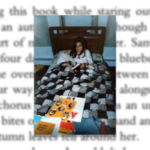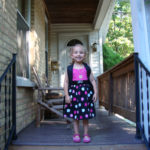It is 2005, and my newborn daughter’s breathing is wet, gurgling, raspy and fast. It gets worse every time I feed her, and when I consult my dusty copy of Dr. Spock to see what he says on the topic of infant breathing, it tells me that she is taking far too many breaths per minute.
I take her to the doctor, who waves me off. “Rapid breathing of the newborn,” he says. “She’s fine.”
It gets worse and worse and finally, we make an appointment with a specialist. Terrified that the specialist will send me back home, where I have to turn my tv louder to hear it if my six pound month-old baby is breathing in the same room, I wrack my sleep-addled brain for a way to convince any doctor that Something Is Not Right With This Baby.
And then I find USAmma.
On the parenting forums at Mothering.com, USAmma is posting regularly about her baby daughter who suffered from terrible reflux. Though she is active on several forums there, most often I see her answering questions about GERD (gastro esophageal reflux disease). If any parent mentions reflux, inevitably, USAmma responds. At one point, she shares links to a series of videos she and her husband had made of their daughter exhibiting behaviors consistent with severe reflux.
It is my light bulb moment. I take the tape recorder I usually keep in my violin case — to record fiddle tunes from local fiddlers — and set it next to me on the couch. I turn off the TV. I record my baby breathing, then nursing, and then breathing after nursing.
When I play the recording for the specialist, his eyes widen. He rewinds, listens again. Then he gives her a diagnosis. As I leave, he thanks me for making the recording.
“That was very smart,” he tells me. “Great idea.”
I write to USAmma, and thank her.
It is mid-2006, and I am going out of my mind with the tedium of at-home motherhood.
I hear about a new blog network called Zaadz. A friend from my old life, someone who’d championed my work and enjoyed even my boring technical writing, tells me to start a blog about playing the fiddle and writing a book. “Call it ‘Fiddle and Quill,'” she suggests.
I call it “Here we go,” instead, and start writing about what’s happening. I tell the story of my sick little baby’s birth — a series I call “Woah Baby” — and out of no where, a mother from Alaska contacts me to say that her son, born a week after my daughter, has the same diagnosis.
We chat online every day. Her son vomits; my daughter wheezes. She lives in the country; I live on an alley in the city. Alone in my kitchen with a baby constantly attached to me and orders not to take her out among people and germs, I see my friend in Alaska as a lifeline. Without her, I would be heartbreakingly lonely. In the process of comparing medical notes, we become fast friends.
I keep writing our story. She keeps reading.
It is 2014, and my baby is eight years old.
I join a committee at our local synagogue and find myself the youngest person in the room by more than a decade. Everyone else has raised their children. I am intimidated, wondering if I have enough in common with this group to forge relationships. I needn’t have worried; the committee is full of good souls with open minds, and we work together well.
Several months into the work, I learn that my daughter will need cardiac surgery — her second operation, and more complex. Distracted and flustered, I walk into our monthly meeting and share the news. I expect nods, side-hugs, and perhaps offers of ambiguous help. Instead, one committee member looks across the table with faint tears in her eyes and says:
“Did you know my son was in that cardiac ward for over a month a few years ago?”
I hadn’t known. She tells me about the virus that attacked his heart, the weeks she spent in the hospital with him, and the recovery he made thanks to the very same surgeon who would soon be operating on my daughter. She talks about her current volunteer work on that same ward, the wonderful nurses and the dedicated volunteers who will surely make our stay as easy as they can.
As the weeks go on, she checks in with me. Before the surgery, she sends me an email, and after it’s over, when I email the large group of well-wishers with the good news that it was a success, she is one of the first to respond.
“So glad to hear! Obviously, still a ways to go, but sounds overall like good news. Phew!”
Years later, she admits to me that she worries about how much she shares the story of her son’s illness and how it affected her. When she says that, my own heart sinks a little. I, too, worry that I talk and write about my daughter’s illness too often. Then, I think of the stories above — how someone’s willingness to share their experiences had a direct and positive impact on exactly the person who needs that information most.
Where would I be without USAmma?
Where would I be without my friend from Alaska?
Where would I be without my fellow committee member?
Begging for the recognition of a problem. All alone in the world. Terrified without a soul who understood me.
I’m going to keep talking and writing. I hope others do the same.







Thank you for not letting a culture of “independence” and the concerns it breeds about over-sharing and calling attention to ourselves and our family’s struggles stop you from speaking out. I am sure you are a lifeline to many in similar situations, and, beyond that, you are an inspiration to others who are not (like myself). You also are a source of information and insight into a world I wouldn’t know to care about, were it not for you!
Andrea, you always know just how to frame things. Thank YOU!